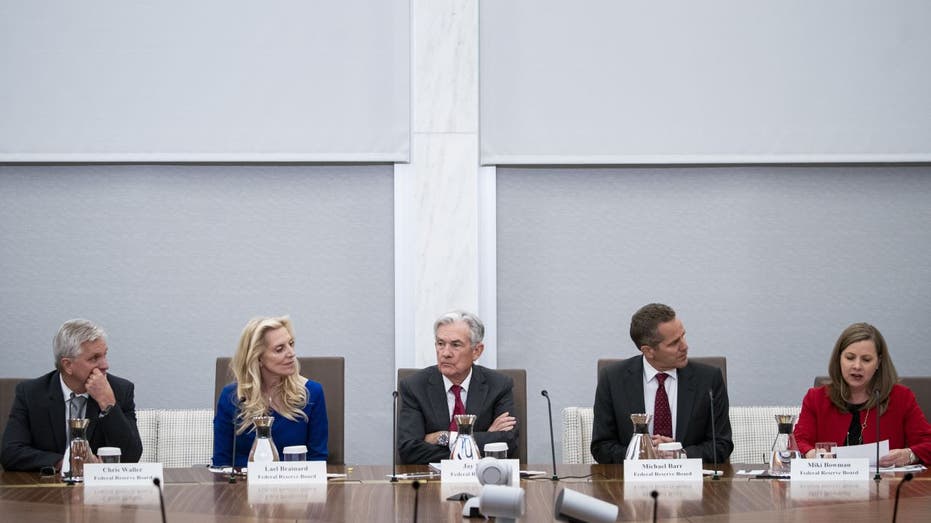Key Fed inflation gauge, consumer spending rise in February
Excluding food and energy, prices rose 2.8% annually
US economy is 'in dire need' of fiscal responsibility: Maya MacGuineas
Committee for a Responsible Federal Budget President Maya MacGuineas explains the 'three basic ways' Biden could reduce national debt.
A key inflation gauge watched closely by the Federal Reserve climbed on an annual basis in February.
The Commerce Department's personal consumption expenditures price index (PCE) headline figure rose 2.5% last month, in line with expectations. On a monthly basis, prices rose 0.3%, slightly below the estimate of economists surveyed by LSEG.
Excluding food and energy, so-called core PCE prices rose 2.8% annually in February and 0.3% from the prior month. Both figures were in line with expectations, and the year-over-year figure is slightly lower than January's reading of 2.9%. The January monthly core PCE reading was revised upward from 0.4% to 0.5%. For inflation to return to the Fed's 2% year-over-year target, monthly inflation readings over 0.2% are necessary over time to lower the headline rate.
Federal Chair Jerome Powell said the inflation data for February released on Friday was "more along the lines of what we want to see."
"It's good to see something coming in line with expectations," Powell said in an interview at the San Francisco Fed after the data was released.
Consumer spending spiked 0.8% last month, up from the 0.2% increase in January. That figure came in higher than the 0.5% increase that the LSEG economists' survey projected.
YELLEN SAYS ENERGY, HEALTH CARE COSTS STILL ‘TOO HIGH’ AND ARE ‘TOP ECONOMIC PRIORITY’

The Fed's favored inflation gauge – known as the personal consumption expenditures price index – rose slightly last month. ((Photo by BRENDAN SMIALOWSKI/AFP via Getty Images) / Getty Images)
The report found that prices for goods rose by 0.5% from January while prices for services ticked up by 0.3%. On a monthly basis, food prices increased 0.1% and energy prices rose by 2.3%.
Compared with the same month a year ago, prices for services increased 3.8% while goods decreased by 0.2%. Food prices were up 1.3% and energy prices declined by 2.3% from last year.
BALTIMORE BRIDGE COLLAPSE: ECONOMISTS PREDICT INFLATION ‘PINCH’ FOR AMERICAN CONSUMERS
| Ticker | Security | Last | Change | Change % |
|---|---|---|---|---|
| SP500 | S&P 500 | 6932.3 | +133.90 | +1.97% |
| I:COMP | NASDAQ COMPOSITE INDEX | 23031.213218 | +490.63 | +2.18% |
| I:DJI | DOW JONES AVERAGES | 50115.67 | +1,206.95 | +2.47% |
Federal Reserve officials held a policy meeting last week and left the central bank's federal funds rate unchanged at a range of 5.25% to 5.50%. The Fed has raised the benchmark rate – which influences interest rates for mortgages, loans and credit cards – by 525 basis points since March 2022.
Inflation hasn't subsided as quickly as policymakers had expected, which prompted the Fed's decision to leave interest rates unchanged.

Prices for goods in February were up 0.5% from January, while services prices increased 0.3%. ((Photo by Spencer Platt/Getty Images) / Getty Images)
FED LEAVES INTEREST RATES UNCHANGED, SAYS THREE CUTS STILL PLANNED
Stubborn inflation has lowered expectations that there may be as many as six interest rate cuts this year, although a smaller number of cuts are still projected.
Policymakers anticipate three rate cuts this year, according to the CME's FedWatch tool. Financial markets expect the first rate cut to occur in June, although Fed officials haven't provided a timeline and say they'll continue to monitor economic data.
Christopher Waller, a member of the Federal Reserve Board of Governors, said Wednesday that "there is no rush to cut the policy rate" right now but didn't rule out lowering the benchmark rate later this year.

Federal Reserve officials say they'll continue to monitor economic data as they weigh potential interest rate cuts. (Photographer: Al Drago/Bloomberg via Getty Images / Getty Images)
GET FOX BUSINESS ON THE GO BY CLICKING HERE
FOX Business' Suzanne O'Halloran and Reuters contributed to this report.




















